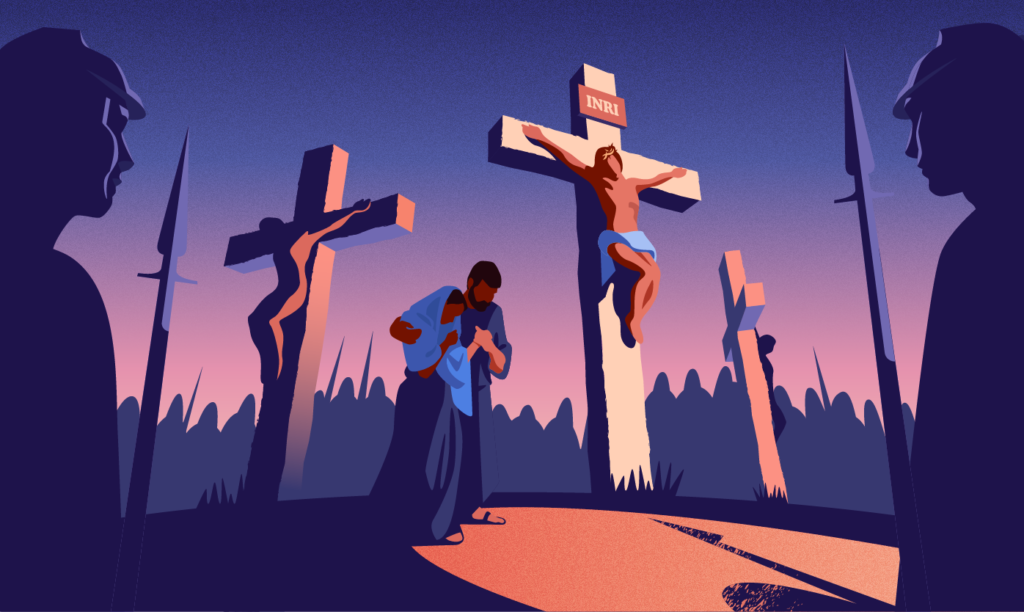He hung there.
On the cross, tortured. Dying. The hard metal of the nails fastening his legs and feet in place.
As he struggled for air and was barely able to breathe, Jesus didn’t hang in silence.
He spoke to those around him, to complete strangers and to his family and friends.
Jesus was speaking to us in his final hours.
In his Seven Last Words, Jesus shows us how he has fulfilled his saving mission and sends us forth to follow in his footsteps.
What are the 7 Last Words of Christ?
Throughout the #Pray40 Lent Challenge in 2022, Hallow users spent time reflecting on all seven. Together, they anchored our prayer to Jesus’ time on the cross, keeping our hearts fixed on Jesus’s sacrifice.
It begins with a word that our minds come to know more easily than our hearts.
“Father, forgive them, they know not what they do.” – The First Word (Forgiveness)
“When they came to the place called the Skull, they crucified him and the criminals there, one on his right, the other on his left. Then Jesus said, “Father, forgive them, they know not what they do.”
Luke 23:34
We’re familiar with Lent being a season of repentance; in fact, we hear “Repent, and believe in the Gospel” as we receive ashes on our foreheads.
During Lent, we seek forgiveness. But how often do we offer it?
As Jesus hung on the cross, he pleaded with his Father to forgive his tormentors, at whose hands he suffered unimaginable pain.
Jesus’s last words remind us that God’s forgiveness knows no boundaries. We need God’s help and grace to be able to forgive in such a way.
Do we place limits on what we are willing to forgive?
We will start this week with the Litany of Humility on Ash Wednesday and continue with reflections from Archbishop Fulton Sheen and meditations on forgiveness, forgiveness of ourselves, others, and from God.
“Amen, I say to you, today you will be with me in Paradise” – The Second Word (Salvation)
Now one of the criminals hanging there reviled Jesus, saying, “Are you not the Messiah? Save yourself and us.” The other, however, rebuking him, said in reply, “Have you no fear of God, for you are subject to the same condemnation? And indeed, we have been condemned justly, for the sentence we received corresponds to our crimes, but this man has done nothing criminal.” Then he said, “Jesus, remember me when you come into your kingdom.” He replied to him, “Amen, I say to you, today you will be with me in Paradise.”
Luke 23: 39-43
The good thief, known as St. Dismas, shows us the power of conversion.
Along with its reward.
A convicted thief, St. Dismas presumably did not lead the most holy life. Yet as he hung alongside Jesus, his eyes were opened to the presence of God. With his final dying breaths, he proclaimed Jesus as Lord of all creation.
Jesus recognizes this act of faith and affirms to St. Dismas that he will join him in heaven.
The promise of God’s kingdom is so great. St. Dismas realized this as he was at the side of Jesus. During Lent, when we find time to be present with Jesus, we’re reminded of the beautiful gift of our salvation and our call to bring God’s kingdom to earth, as it is in heaven.
Jesus’s words remind us that no matter how many times you’ve sinned, or how long it’s been since you prayed, God is always looking to forgive you.
In this second week of Lent, we will reflect on Jesus as King as we seek to have the same faith as the good thief. We will pray with the names of Jesus in the Litany of Christ the King and offer up our sins and praises to God.
“Woman, behold, your son….Behold, your mother.” – The Third Word (Relationship)
“Standing by the cross of Jesus were his mother and his mother’s sister, Mary the wife of Clopas, and Mary of Magdala. When Jesus saw his mother and the disciple there whom he loved, he said to his mother, “Woman, behold, your son.” Then he said to the disciple, “Behold, your mother.” And from that hour the disciple took her into his home.”
John 19: 25-27
Why did Jesus address Mary as “woman” on the cross?
Some suggest that it was a term of honor and respect. Others believe that by saying “woman” and not “mother,” Jesus shows that Mary is not simply his mother, but who Catholics believe to be the Blessed Mother of us all, given to us as Jesus hung on the cross.
In his most agonizing moments, Jesus gives all of us, as his disciples, the gift of his mother. He entrusts us to each other. We can turn to Mary with confidence, knowing that she loves us as a mother and wants nothing more for us than to remain close to her son.
We can be assured of her prayers for us and find comfort in her heart, a heart completely full of love for Jesus.
We will pray alongside Mary, our Mother this week with Hallow’s most popular prayer, the Rosary, and connect to her agony through the Litany of Our Lady of Sorrows.
“I thirst.” – The Fourth Word (Distress)
“After this, aware that everything was now finished, in order that the scripture might be fulfilled, Jesus said, “I thirst.” There was a vessel filled with common wine. So they put a sponge soaked in wine on a sprig of hyssop and put it up to his mouth.”
John 19: 28-29
Water, thirst and drinking are all part of a common motif throughout the Gospels, especially in John.
Jesus tells us in John 7: “Let anyone who is thirsty come to me, and let the one who believes in me drink.”
In this moment on the cross, Jesus, who offers us the promise of living waters through the Holy Spirit, is dry.
Parched.
Empty.
We can all relate to the feeling of both physical thirst and inner emptiness.
But what else was Jesus thirsting for? In this moment, Jesus was betrayed by humanity and feeling forsaken by his heavenly Father.
He thirsts for us, he wants nothing more than for us to fully understand just how much he loves us and for us to love him in return. When Jesus called out his thirst upon the cross, he was given the sour taste of vinegar. In the same way, we too often respond to Jesus’s thirst not with our love, but with the vinegar of a heart hardened to God.
This week, reflect with an Examen on what it means to thirst for God and offer prayers and petitions for those who thirst physically and spiritually this week.
“My God, my God, why have you forsaken me?” – The Fifth Word (Abandonment)
“At noon darkness came over the whole land until three in the afternoon. And at three o’clock Jesus cried out in a loud voice, “Eloi, Eloi, lema sabachthani?” which is translated, “My God, my God, why have you forsaken me?”
Mark 15: 33-34
Utter humanity.
When God feels far off and distant, or when we struggle to feel connected to Jesus, these words can help remind us of just how human Jesus was.
Have we not all felt forsaken at times?
In this, his most human and vulnerable moment, Jesus is quoting Psalm 22, which we sing on Good Friday.
When we feel abandoned, as Jesus did when he cried out to his Father, the conclusion of Psalm 22 reminds us that darkness does not get the final word.
All the ends of the earth will remember and turn to the Lord, and all the families of the nations will bow down before him, for dominion belongs to the Lord and he rules over the nations. All the rich of the earth will feast and worship; all who go down to the dust will kneel before him— those who cannot keep themselves alive. Posterity will serve him; future generations will be told about the Lord. They will proclaim his righteousness, declaring to a people yet unborn: He has done it!
Psalm 22: 27-31
This week, we will pray the powerful Litany of Trust, reflecting on what it means to give everything to God.
“It is finished.” – The Sixth Word (Triumph)
“When Jesus had taken the wine, he said, “It is finished.” And bowing his head, he handed over the spirit.”
John 19:30
Each year at the Easter Vigil, before we hear the Gospel of the Resurrection, we read a passage from Isaiah 55 where the Lord speaks to us:
“Yet just as from the heavens the rain and snow come down And do not return there till they have watered the earth, making it fertile and fruitful, Giving seed to the one who sows and bread to the one who eats, 11 So shall my word be that goes forth from my mouth; It shall not return to me empty, but shall do what pleases me, achieving the end for which I sent it.”
While he hung on the cross, Jesus, Word made flesh, had accomplished everything he needed to. Having taken the full weight of humanity’s sins, he’s given himself fully. He achieved the end for which he was sent.
Jesus has triumphed. His work is complete. These words are his earthly farewell.
This week, pray the Litany of Burying the Dead alongside reflections on how to give of yourself with love.
“Father, into your hands I commend my spirit.” – The Seventh Word (Reunion)
It was now about noon and darkness came over the whole land until three in the afternoon because of an eclipse of the sun. Then the veil of the temple was torn down the middle. Jesus cried out in a loud voice, “Father, into your hands I commend my spirit”; and when he had said this he breathed his last”.
Luke 23: 44-46
Sr. Marie Veritas, SV points to the magnitude of Jesus’ final words, and the symbolism they offer.
“What does Jesus say with his last words that he has on earth to us? What does he do? He points us to the Father. He throws himself into the arms of the Father. And then he lets go.”
In the sixth word, Jesus triumphs. Now he enters into heaven, received by his Father, who lovingly welcomes us all into his kingdom.
Jesus points us to the Father so that we too can throw ourselves into His arms, surrendering to Him, knowing He loves us and will not lead us astray.
And when we place ourselves in God’s arms, we’ll share in the joy that Jesus felt upon His reunion with the Father.
When we place ourselves in God’s arms, we’ll be close to him and share in the joy that Jesus felt upon his reunion with the Father.
SEE MORE: Lent Prayers for 2025 | What to Give Up for Lent | Lent Fasting Rules
We know that death isn’t the final word. Following the seventh word, we eagerly await the joy of the empty tomb.
For this final week, we give it all back to God through the Surrender Prayer. We move from Palm Sunday into the Triduum, walking with Jesus from darkness into the light of Salvation on Easter Sunday.
This Lent, renew your faith and deepen your relationship with God through reflecting and meditating on the greatest sermon ever given, the Seven Last Words of Christ.
Peace be with you this Lent.
Join the Hallow Community

